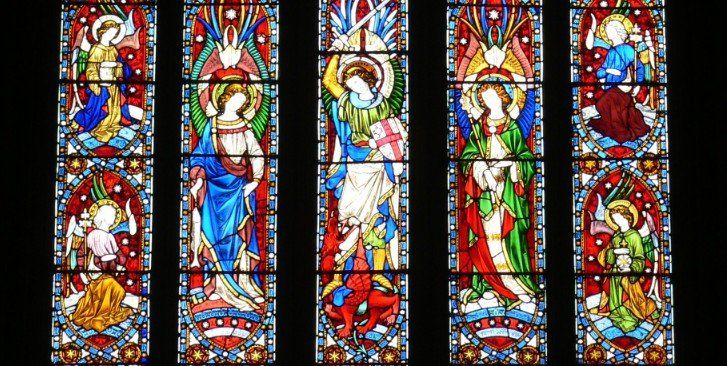St Michael & All Angels
The angels teach us to sing and to pray
The community celebrated its patronal feast on 29th September, and a good congregation joined us for Mass. Abbot Paul gave a short homily:
We
don’t often talk about angels, unless when showing visitors around the Abbey.
Even devout Catholics today think of angels as part of Christian mythology and
don’t quite know what to make of them. That’s strange, considering that magic
and witchcraft are now such lucrative para-religious enterprises and that in
the fast changing world of cyberspace everything lives on clouds, even our
archives and photograph albums.
St Paul says that the angels are “all ministering spirits, sent out in the divine service for the sake of those who are to inherit salvation.” The prayers and preface of today’s Mass take up that theme. The angels, who worship before God’s throne, are also his messengers and servants. Not only do they worship God, but they also help us to praise him by the holiness of our lives. In heaven they lead the laus perennis of which our Opus Dei is an echo here on earth.
There’s hardly a page of Scripture where the angels of God are not present. If anything, it’s the angels who give cohesion to the Bible, binding the History of Salvation together. They are the ones who constantly reveal God’s will to Man. In the Old Testament, they represent God before patriarchs, prophets and kings, whilst in the New Testament they are the prime movers in the Gospels, Acts and Book of Revelation.
Can you imagine the Annunciation without Gabriel or the Nativity without angels? Indeed, it is they who teach us to pray, “Hail Mary, full of grace,” and to sing, “Gloria in excelsis Deo.” Think of the forty days in the wilderness and the angels who ministered to Jesus in his temptations. Think of Gethsemane and the Angel of the Passion, or of the empty tomb and the message of the Easter Angel, “Why do you seek the living among the dead?” What would we have made of the Ascension had the Angel not told the disciples, “Men of Galilee, why stand there looking at the sky? He will come again just as you have seen him go to heaven.” In the Acts of the Apostles, Peter, Paul and the others are guided by angels in their mission, set free from prison and protected as they fearlessly set about preaching the Gospel.
Finally, what would we make of our own lives and of this present uncertain moment in world history without that powerful chapter in the Apocalypse where the archangel Michael does battle with Satan? Nothing we do can change the past, but what we do now can change the future. Today, more than ever, the world needs the guidance and protection of St Michael and the Holy Angels. Today, we need to pray, “Holy Michael Archangel, defend us in the day of battle.”
May Christ, the King of Angels, grant peace and unity to his Church, the world in which we live and the whole of creation through the ministry of the Holy Angels. Amen.










